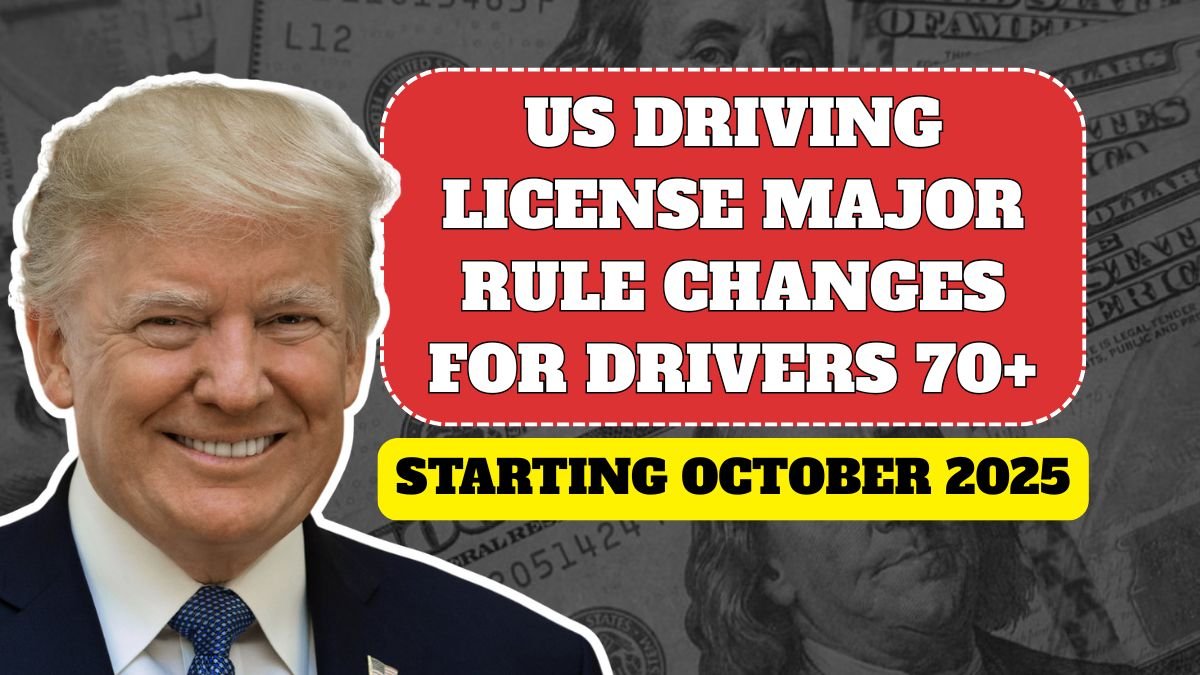Discussion about changes to the driver’s license renewal process for US citizens aged 70 and older, effective October 2025, is rapidly gaining traction on social media and news channels. Numerous rumors have circulated on social media that annual license renewals, vision tests, and cognitive tests will now be mandatory for senior citizens. However, these reports often contain incomplete and inaccurate information.
In fact, no new national regulations have yet been implemented. Rules vary across states. This article provides detailed information about these changes, potential states, and the necessary preparations for senior citizens.
Social Media vs. Reality
Claims on social media and viral sites suggest that national regulations will apply to all drivers aged 70 and older starting October 2025. This has caused concern among many senior citizens. However, the reality is that not all states will implement the same rules.
For example, in California, drivers over 70 must renew their licenses in person at a DMV office and pass a vision test. States like Florida, Texas, and New York may implement different changes based on their own regulations.
Therefore, the rumor that a “new national rule for all seniors will take effect in October 2025” is not true.
Possible Changes from October 2025: State-Specific Rules

Although no national rule has been implemented, some states may experience changes in their rules starting in October 2025. The main changes are as follows:
1. In-Person Renewal
In many states, senior citizens will no longer be able to renew their licenses online or by mail. They will be required to appear in person at a DMV office and complete the form. This rule is implemented so that senior citizens’ driving ability can be evaluated based on their physical and mental condition.
DMV staff may conduct vision tests, identification document checks, and sometimes even cognitive tests. The purpose of this process is to ensure the safety of senior citizens and everyone else on the road.
2. Shorter License Term
License terms are often 5-8 years for young drivers, but for senior citizens, this term can be reduced to 2, 3, or 4 years. This decision is based on age, health status, and state regulations.
The purpose of this is to recognize that senior citizens’ physical and mental health changes over time, and periodic evaluation is essential.
3. Vision Test and Health Report
In many states, senior citizens are required to pass a vision test. Additionally, if there are serious health problems, a doctor’s report may also be required.
This rule is in place to reduce the risk of road accidents and ensure that senior citizens can drive safely.
4. Driving or Practical Test
For some seniors, especially those with serious health conditions, a driving test or practical road test may be mandatory. This is to ensure they are safe on the road and not a hazard to other drivers.
5. Reporting System
In many states, family members, doctors, and caregivers can report to the DMV if they believe senior drivers are unsafe on the road. The DMV will then evaluate the driver’s competency. This is for safety purposes only, not for individual differences.
Which states have already implemented regulations?
Some major states that have already implemented regulations or will implement them starting October 2025 include:
- California: Mandatory individual renewal and vision testing for drivers over 70.
- Florida: Vision testing at every renewal over 80.
- Texas: Mandatory annual health checkups over 85.
- New York: A doctor’s certificate may be required for drivers over 80.
These regulations are designed to ensure the safety of seniors and reduce the risk of road accidents.
What to do if affected?
If you are 70 or older, the following steps may be helpful:
- Check with your state’s DMV: It’s important to know what regulations apply in your state.
- Get vision and health tests in advance: Have all necessary reports and documents ready.
- Don’t leave it to the last minute: if you need to renew your license, go before your license expires.
- Maintain a good driving record: A record of traffic violations can complicate the renewal process.
- Have necessary documents ready: Always have identification, medical, and other necessary documents ready.
Options and Tips for Seniors
If driving is unsafe for any reason, seniors have several options:
- Ride-sharing services: Services like Uber and Lyft are safe and convenient options.
- Community shuttles and transportation programs: Many cities offer special shuttle or community bus services.
- Help from family and friends: Seeking transportation assistance for essential errands is also an option.
These options can help seniors stay safe and independent.
Conclusion
Starting October 2025, driver’s license renewals for Americans 70+ may change, but no national regulations will be implemented. Rules will be state-specific.
Individual renewals, vision and health exams, shorter license terms, and practical tests ensure safety for seniors and everyone on the road.
If you’re 70 or older, it’s important to be aware of these changes and prepare. This will not only simplify the license renewal process but also ensure your safety and that of other road users.
FAQs
Q: Will all U.S. states implement the new license rules for seniors in October 2025?
A: No, rules will vary by state. Not all states have the same requirements.
Q: What age group is affected by these potential changes?
A: Drivers aged 70 years and older may face different renewal procedures.
Q: Are vision and medical tests mandatory for all senior drivers?
A: Only in states that require them; not every state has the same rules.
Q: Can seniors still renew their license online or by mail?
A: In many states, seniors must appear in person at the DMV for renewal.
Q: What options exist if driving is no longer safe for seniors?
A: Seniors can use ride-sharing, community shuttles, or family support for transportation.


